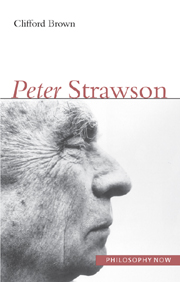Book contents
- Frontmatter
- Contents
- Abbreviations
- Introduction
- 1 “On Referring” and Introduction to Logical Theory: The basic questions
- 2 Individuals: An Essay in Descriptive Metaphysics: Towards a basic ontology
- 3 The Bounds of Sense: Kant's first Critique under analysis
- 4 Skepticism and Naturalism: Hume revisited
- 5 Analysis and Metaphysics: Summing up
- Notes
- Bibliography
- Index
3 - The Bounds of Sense: Kant's first Critique under analysis
- Frontmatter
- Contents
- Abbreviations
- Introduction
- 1 “On Referring” and Introduction to Logical Theory: The basic questions
- 2 Individuals: An Essay in Descriptive Metaphysics: Towards a basic ontology
- 3 The Bounds of Sense: Kant's first Critique under analysis
- 4 Skepticism and Naturalism: Hume revisited
- 5 Analysis and Metaphysics: Summing up
- Notes
- Bibliography
- Index
Summary
The Bounds of Sense: An Essay on Kant's Critique of Pure Reason (1966a) builds on the questions and the answers that are central to Strawson's Individuals. In Individuals, Strawson had attempted to establish the conditions that are presupposed by the knowledge and experience we plainly do have. As we have seen, Individuals has its roots in the earlier Introduction of Logical Theory and “On Referring”. In “On Referring”, the use of the sentence “The king of France is wise” as a statement at this present time is neither true nor false, since its presupposition that there is a present king of France is false. Presupposition is thus carefully distinguished from both assertion and entailment, and in this way the critically misleading trichotomy framework of Russell's theory of definite descriptions is avoided. Taking into account the notion of presupposition in this way is a key to any properly descriptive account of our human experience; it is useless to argue for a point which is presupposed by the argument itself. This attention to the use of presupposition underlies all three of Kant's critiques, and so it was altogether natural that in Strawson's continuing reflection on the issues that he raises in Individuals, he found it rewarding to reconsider the major lines of the Critique of Pure Reason, and to offer an assessment of the strengths and weaknesses of Kant's work in the light of our contemporary analytic tradition.
- Type
- Chapter
- Information
- Peter Strawson , pp. 93 - 142Publisher: Acumen PublishingPrint publication year: 2006

